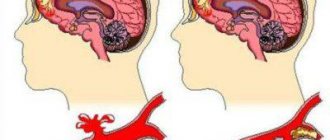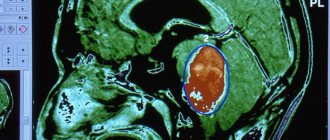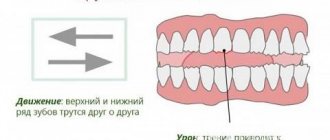.
Many people know that stress has a negative effect on the body, and vision can rapidly deteriorate. The consequences of long-term mental stress can be extremely negative for the visual organs, so you need to know how to protect yourself.
Stress negatively affects vision
Effect of stress on the visual system
When difficult situations arise in life, the human body exhibits specific variants of reflexes that affect its various systems. In this case, vision bears the brunt. It is important to know how stress affects the visual system, and this happens in several ways.
So-called black spots appear before the eyes as a result of too much breathing. In such conditions, the oxygen level becomes critically high, and the level of carbon dioxide decreases, which leads to a state of hyperventilation, and the reaction to such an imbalance is unpleasant sensations.
Black dots before eyes
Stress leads to enlarged pupils, which is accompanied by tunnel vision syndrome, that is, a person sees only the image that falls on the retina, and peripheral vision is lost for some time. A similar reaction exists as a result of the evolution of the body: it is necessary for the pupil to become wider, so a person can better orient himself in space. But this was important in times of lack of lamps and other lighting. Nowadays, this reaction creates interference and makes the vision of the image unclear. Tunnel vision is usually only a temporary response to stress.
Tunnel vision is a consequence of stress
In a critical situation, the heartbeat quickens and blood pressure rises, thus preparing the body for active action. This means that under stress, the cardiovascular and visual systems are primarily negatively affected.
Thus, it becomes clear that stress leads to deterioration and decrease in visual acuity.
All of the above symptoms are usually temporary, but with prolonged stress, when feelings of anxiety persist, the following symptoms may appear:
- overwork of the eye muscles;
- eye twitching;
- increased fatigue;
- migraine;
- feeling of dust and dry eyes;
- increase in eye pressure.
Why does vision deterioration occur due to nervousness?
If we consider the structure of the human eye, we can see that various muscles are responsible for its proper functioning, which constrict the pupil, change the curvature of the lens - the natural lens of the eye that ensures focusing of vision, etc. In addition, the good functioning of the visual organs depends on the normal circulation of intraocular fluid, as well as sufficient blood supply and tissue nutrition.
Mental experiences and stress lead to excitation of the nervous system, as a result of which excessive tension of the eye muscles occurs, the shape of the eyeball changes, vasoconstriction occurs, and the tissues begin to experience a lack of blood supply. The constant overstrain of the eye muscles that occurs due to nervous conditions causes their improper functioning, leading to the development of refractive errors - myopia, farsightedness and astigmatism. In this case, people usually resort to wearing glasses or contact lenses, but as a result, the eye muscles weaken even more and the problem gets worse. And insufficient blood supply to the retina and optic nerve leads to the emergence of pathological processes that threaten the development of glaucoma and other very serious diseases.
What are the dangers of stress for vision?
If we consider the structure of the eye, it becomes clear that muscles are responsible for its functioning. Mental experiences excite the nervous system, and because of this, overstrain of the eye muscles occurs, blood vessels narrow, and blood supply deteriorates. Constant muscle strain causes deterioration in eye function, which leads to the development of astigmatism, myopia and farsightedness.
Myopia is a consequence of stress
We suggest you familiarize yourself with Pain in the eyes after solarium
A disorder of the structure of the eyeball, when the image is transmitted distortedly to the retina, is commonly called astigmatism. Farsightedness is usually an age-related change in which a person sees well in the distance, but nearby objects become blurry. Myopia is the opposite of this diagnosis and is often explained by genetic factors.
The eye and stress are closely related, so under circumstances of vision impairment, people start wearing glasses or contacts, and because of this, the eye muscles become even weaker, and the problem worsens. A low level of blood supply to the retina can be fraught with the occurrence of irreversible processes: glaucoma and other serious diseases may develop. With constant exposure to negative factors, even loss of vision is possible.
Stress factors affecting vision
Stress is the body's reaction to external stimuli - stressors. Stress is not always some kind of unpleasant situation; it can be “bad” and “good”. Positive stress refers to some pleasant events, for example, the birth of a child, falling in love, or learning new sports.
By its nature, stress can be physical (for example, overwork, lack of sufficient sleep, unexpected situations on the road, temperature effects), mental (for example, a state of anxiety, worries, difficulties at work or with finances), social (for example, the loss of a loved one, bad relationships with neighbors or colleagues at work, difficulties in marriage or family).
When exposed to a stressor, reflexes are activated in the body, mobilizing a person’s strength for a quick “fight or flight” reaction. There is a sharp release of the hormone adrenaline, which causes an increase in blood pressure, increased heart rate and breathing, as well as dilated pupils and the so-called tunnel vision.
The effect of pupil dilation is a method of protection developed by evolution. In danger, it is important that the hole through which light enters the retina (i.e. the pupil) is as wide as possible. Thus, a person will be able to better orient himself in space and be able to escape. This reaction took shape when artificial lighting had not yet been invented. Now this effect is disturbing, it leads to a blurred and unclear image, as well as a temporary loss of peripheral vision.
Due to increased heart rate and blood pressure during stress, the cardiovascular system is one of the first to suffer. A narrowing of the mucous membranes occurs, this also applies to the mucous membrane of the eye. Increased breathing causes oxygen levels to increase and carbon dioxide levels to decrease, leading to a state of hyperventilation. It is because of this that unpleasant sensations familiar to many arise: “black spots” and “sand in the eyes.”
Typically, all these symptoms are caused by severe short-term stress. If stress affects the body for a long time, then new health problems may arise in the form of dry eye mucosa, overstrain of the eye muscles, eye twitching and increased eye pressure and, as a result, regular migraines. All this together can cause decreased visual acuity and various eye diseases.
In order for stressful situations to have as little negative impact on the body and eyes as possible, it is necessary to learn how to respond correctly to stressors. If you feel stressed, afraid and anxious, first of all, try to calm down and relax. Then take a comfortable position, close your eyes and rotate them from top to bottom, from side to side, so you relax the eye muscles.
In general, try to worry as little as possible and not create overexertion: walk as much as possible, sleep at least 8 hours, and do not forget to get enough rest between work. And also try to monitor your diet so that the body receives enough vitamins and microelements, this will help it in the fight against daily irritants.
At the “Simply Optics” optics salon, you can have your eyesight checked by a professional ophthalmologist. He will give recommendations on how to prevent decreased visual acuity and, if necessary, write a prescription for glasses. The salon specialist will tell you about the different types of frames and spectacle lenses and help you make your choice.
www.skladlinz.ru
How to avoid vision deterioration
In order to maintain good vision, you need to try not to succumb to stress and relax more often. To relieve overstrain, especially if your professional activity involves working on a computer, special eye exercises are well suited, which are best performed on a regular basis.
Eye exercises:
- Close your eyes and then open your eyes wide. Repeat the exercise 5-6 times.
- Look up, down, to the sides without moving your head. Repeat 3 times and then do the same with your eyes closed.
- Rotate your eyes clockwise and in the opposite direction. Repeat 3 times, then perform the exercise with your eyes closed.
- Blink rapidly for a minute.
- Stand near the window, look for some point or scratch on the glass. Look at it for 15 seconds, then for the same time, turn your gaze to some distant object outside the window. Borrow back to the point on the glass. Repeat 3-5 times.
- Rub your palms until they become hot. Then close your eyes for a few minutes, relax and imagine something pleasant, for example, the seashore or a forest landscape.
Proper nutrition is of great importance for eye health. The diet must include foods rich in vitamins A, C, D and E. Experts especially recommend eating fresh blueberries, which contain a substance that restores visual pigment. You can take special vitamin and mineral complexes for eye health, drink herbal teas that strengthen vision and have a calming effect on the nervous system.
The ARTOX Clinic offers diagnosis and treatment of any eye problems at affordable and affordable prices. Our experienced specialists will help you regain and maintain good vision.
View prices
Making an appointment with an ophthalmologist
Symptoms of the disorder
If any symptoms, even minor ones, appear, you should pay attention to them, including if they are periodic. These include:
- Deterioration of vision. The person begins to have difficulty seeing objects near or far, or objects become irregular in shape.
- Double vision. Objects may begin to double after eye or head injuries, but this symptom can also be a sign of serious illness.
- Dizziness and headaches. This sign may indicate both neurological problems and eye diseases. If it is combined with deterioration of vision, then pathology of the visual apparatus is likely.
- Itching, burning, feeling of “sand”. This indicates problems with the mucous membrane.
- Painful sensations. Pain in the eyeball is often caused by infectious or inflammatory diseases, increased intraocular pressure, pathologies of the lens and retina.
- Dry eyes. The reasons may be different: insufficient secretion of tear fluid, diseases of the eyelids, in which the eyelids cannot close completely.
- Impaired pupil reaction. The pupil does not constrict under the influence of light rays and does not expand in the dark. This condition can occur due to head and eye injuries, or the use of drugs or medications.
Temporary loss of vision
Sometimes vision impairment is temporary, but the reasons do not lie in eye disease. Symptoms appear mainly in the evenings, and by the morning they disappear without a trace. Sometimes a person sees worse for several weeks, and then the vision is restored on its own.
It is believed that visual function may deteriorate for the following reasons:
- constant lack of sleep, poor sleep quality;
- constant stress, severe nervous shock;
- severe visual stress, overwork at work.
When overtired and lacking sleep, it becomes difficult for a person to focus on images, and the brain processes information slowly. The picture becomes fuzzy, floats and undresses.
Under stress, the pupil dilates, so image quality deteriorates. Also, due to increased breathing, the oxygen content in the blood increases, so “spots” and “stars” flash before the eyes.
In severe emotional states, visual impairment may persist for weeks or even months. Additionally, headaches and eyelid twitching appear. These problems require treatment because they can cause serious health problems.
Myth 5. Glasses with perforations will help restore vision.
If you wear black glasses with many small holes, the image before your eyes will be clearer, that is, your vision will temporarily improve slightly.
When directly used, these glasses increase clarity of vision due to the fact that focused beams of light enter the retina through many holes in the dark plates.
Rano Ibragimova
Unfortunately, this is not enough. As Rano Ibragimova notes, there is still little convincing scientific data to judge the therapeutic effect of these glasses. It is better to give preference to lenses that block blue-violet light.
Myth 4. Modern screens do not damage your eyesight.
Although screens are better now than before, the eyes still suffer. Why exactly - explained Vladimir Zolotarev: “The principle of operation of all gadgets, except books with electronic ink, is as follows: they emit rays of the visible spectrum, thanks to this we see the image on the screen. This spectrum includes short-wavelength blue-violet rays, which are most dangerous to the eyes. They are dispersed in the structures of the eye, thereby having a negative impact on the quality of vision and worsening the contrast of the image.
Long-term exposure to this light causes symptoms of visual fatigue: blurred vision and eye strain, redness, pain in the brow ridges, and can subsequently lead to retinal damage.”
That is, whatever one may say, even the most modern screens harm us. Lovers of books (regular and electronic) have fewer problems. But even these people must stop reading to look out the window.
Yoga Wisdom
One of the teachings of yoga is that the conservation and accumulation of energy occurs most when a person is concentrated and has his eyes closed. To relax your eyes and your body as a whole, watch the sunrise and sunset.
Take time to travel or get out into nature, into fresh air, and a pleasant landscape will be the best medicine for your eyesight.
Look at the sky, watch the movement of the clouds, watch the starry sky at night and your eyes will be sparkling and your mind will be clear!
Reason 3
Poor circulation.
Nutrition and respiration of all body cells is carried out with the help of blood vessels. The retina of the eye is a very delicate organ; it suffers at the slightest circulatory disturbance. It is these disorders that ophthalmologists try to see when they examine the fundus of the eye.
Conclusion.
Get checked regularly by an ophthalmologist. Retinal circulatory disorders lead to serious diseases. If you are predisposed to this, your doctor will prescribe you medications that improve the condition of blood vessels. There are also special diets that help maintain blood circulation in good condition. In addition, you need to take care of your blood vessels: a long stay in a steam room or sauna, procedures in a pressure chamber, pressure changes are not for you.











